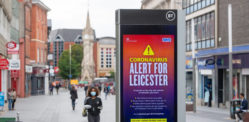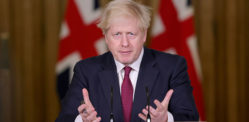"We're ruling nothing out."
The Indian variant of Covid-19 is a cause for concern in the UK as more people are testing positive for this particular strain.
Three variants have appeared in India, but the one drawing the most attention is named B.1.617.2.
The variant was first spotted in the UK in March 2021. It has since been declared a “variant of concern” by Public Health England (PHE).
This came after laboratory and epidemiological studies found it may be more transmissible.
Since April 2021, cases of the strain have risen sharply.
It has been found in travellers from India, contacts of those travellers and also in the wider population.
PHE said the variant is at least as transmissible as the Kent variant that fuelled the UK’s second wave.
While Tom Wenseleers, a professor of evolutionary biology at the University of Leuven in Belgium, suggested that B.1.617.2 may be 60% more transmissible, but estimates of transmissibility are highly provisional.
Rowland Kao, a professor of veterinary epidemiology and data science at the University of Edinburgh, said there was “good evidence” the variant was spreading faster, but that does not necessarily mean it is more transmissible.
He said: “There is likely to be some influence of the communities where it entered the country.”
For instance, if the variant gets into communities that tend to have larger households, or where jobs are hard to do with good social distancing, that could increase transmission.
This could have an effect on Boris Johnson’s roadmap out of lockdown.
The Prime Minister had laid out a “cautious but irreversible” route out of lockdown for England, with the next step planned for May 17, 2021.
However, he warned that new strains, such as the Indian variant, pose a risk to that plan.
Mr Johnson said: “We are anxious about it – it has been spreading.
“We’re ruling nothing out.”
A surge in cases of the variant are in North West England, which has prompted door-to-door testing.
Susan Hopkins, Covid-19 Strategic Response Director at PHE, said:
“Cases of this variant are rising in the community and we are continuously monitoring its spread.”
“We need to act collectively and responsibly to ensure that variants do not impact on the progress we have all made to drive down levels of Covid-19 and the increased freedom that brings.”
Despite the concern, Mr Johnson said there was no evidence to suggest England’s planned lockdown easing could not go ahead.
However, he did not rule out the possibility of local lockdowns in areas where cases are higher.
In a statement, Downing Street said there are “no plans” to reintroduce the tier system in England, but nothing has been ruled out.
The PM had previously opted for a regional approach to restrictions, but that failed and two further national lockdowns followed.
Professor James Naismith, of the University of Oxford, warned that local lockdowns will not contain the spread of the Indian variants.
However, other scientists have stated that there is “no sign” that the Indian variant is causing an increase in hospitalisations, adding that we “need to stop panicking” whenever a new strain emerges.
While local lockdowns may be a possibility, another option is to speed up vaccinations, especially in areas with large clusters of cases.
As younger people tend to have more contacts, they are more likely to spread the virus.
Therefore, vaccinating them earlier than planned could reduce the spread.
But if vaccines cannot be rolled out faster, the government could slow down the roadmap out of lockdown until more data on the variant is in.
While nearly 19 million people have received both vaccine doses, there are still millions of people unprotected.
Christina Pagel, a professor of operational research at University College London and a member of Independent Sage, favours slowing down restrictions lifting.
This is to reduce the risk of having to reimpose tougher lockdown measures later.
Rowland Kao said: “It’s better to be cautious now rather than wait until we are sure because the worst case is hard to rule out.”
The variant may be spreading faster, which could result in local lockdowns and more vaccinations.
But there is no concrete evidence to suggest that it is more transmissible and if it does not cause severe illness or resist vaccines to a great extent, then the outlook is still broadly positive.
Kao added: “We can still expect to be heading towards relaxation.
“It is possible that this will occur at a slower pace, especially in some areas and with some regional prioritisation of vaccination.”





























































